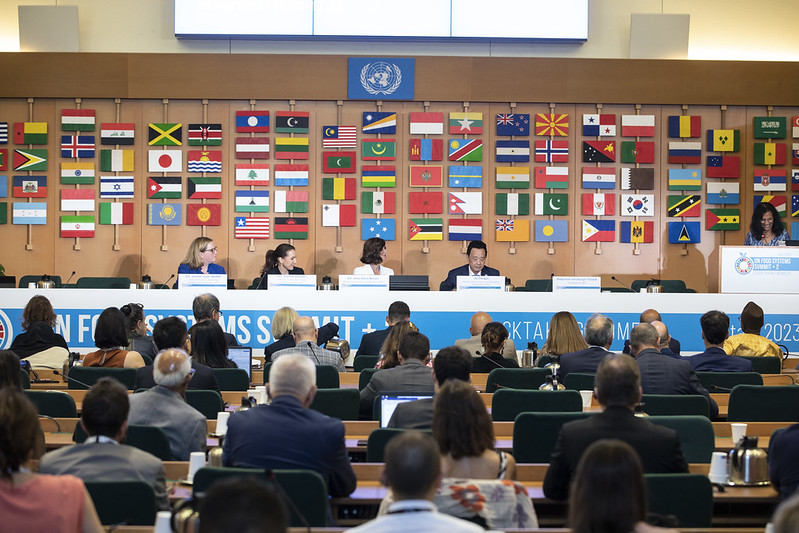PRESS RELEASE: Science, Technology and Innovation Approaches in Paving the Way Forward for Food Systems Transformation
UN Food Systems Summit +2 Stocktaking Moment gave recognition to the importance of using science, technology and innovation approaches as evidence-based guides to shape national and sub-national food systems transformation.

Pictured: Panel members speaking at the UN Food Systems Summit +2 Leadership Dialogue on Science, Technology and Innovation.
©FAO/Giulio Napolitano
Rome, 4 August 2023 – The Scientific Advisory Committee (SAC) to the UN Food Systems Coordination Hub congratulates the government of Italy, FAO, and various partners for the successful organization of the three-day UN Food Systems Summit +2 Stocktaking Moment (UNFSS+2) in Rome from 24 to 26 July 2023. The UNFSS+2 provided a crucial platform for countries to self-report and assess their progress in implementing action plans and commitments outlined in the National Pathways developed during the UN Food Systems Summit 2021.
The SAC is encouraged to learn that 105 countries have submitted voluntary progress reports, demonstrating their recognition of the importance of food systems transformation in addressing global hunger and malnutrition. These submissions reflect the acknowledgment of the impact of national and sub-national actions in forming a collective, global solution.
The State of Food Security and Nutrition in the World 2023 report revealed that 9.2% of the world's population still suffers from hunger, indicating that the targets set for SDG 2: Zero Hunger are far from being achieved. The recent collapse of the Black Sea Grain Initiative just days before the UNFSS+2 further highlighted the fragility of current food systems and the urgency for targeted solutions.
During the Leadership Dialogue on Science, Technology and Innovation held by the SAC at the UNFSS+2, three key takeaways were identified:
- Science, technology, and innovation serve as powerful accelerators of food systems transformation, integrating multi-disciplinary sciences into coherent and actionable National Pathways that benefit many stakeholders, from policy makers to farmers and youth, leaving no one behind.
- Science, technology, and innovation approaches must bridge nature-positive solutions, traditional and Indigenous knowledge, with modern innovations such as data, bioinformatics, genomics, and A.I. to democratize agri-food sciences for all.
- Science, technology, and innovation approaches must build upon and strengthen past and existing efforts while embracing new avenues for food systems transformation that prioritize inclusivity, equity, and justice.
Dr. Shakuntala Thilsted, Chair of the SAC and Director of the Nutrition, Health and Food Security Impact Area Platform at CGIAR, stated, "The Scientific Advisory Committee, through dialogues with National Convenors, partners, and stakeholders, will continue to support, advance, and strengthen the National Pathways, now and towards 2023. By recognizing the potential of science, technology, and innovation, the SAC can effectively shape coherent, evidence-based, and holistic food systems narratives that respond to present and future challenges and articulate these narratives in upcoming summits and fora."
While the UNFSS+2 addressed numerous critical topics over the three days, the SAC observed significant gaps in the areas of sustainable healthy diets, nutrition, social inclusion, equity, and justice. The SAC emphasized the importance and urgency of assessing holistic, evidence-based technologies and innovations that can be transferred, adopted, adapted, and scaled for wider impact.
The SAC recognizes that the UNFSS+2 provided an excellent opportunity to share country cases and success stories, which can serve as examples to guide National Pathways in achieving the goals of food system transformation. Additionally, the SAC looks forward to the upcoming SDG Summit and FAO Science and Innovation Forum as opportunities to address the gaps identified during the UNFSS+2.
About the SAC:
The Scientific Advisory Committee to the UN Food Systems Coordination Hub (SAC) is composed of 29 nominated pro bono experts, officially announced at the World Food Forum on November 8, 2022 and appointed to their positions on February 16, 2023. The SAC functions as a broker of science and evidence, combining the expertise and strength of the members, to guide and support countries in implementing their National Pathways, supporting evidence-based policymaking.
Contact
For media inquiries and more information, please contact:
UN Food Systems Coordination Hub
